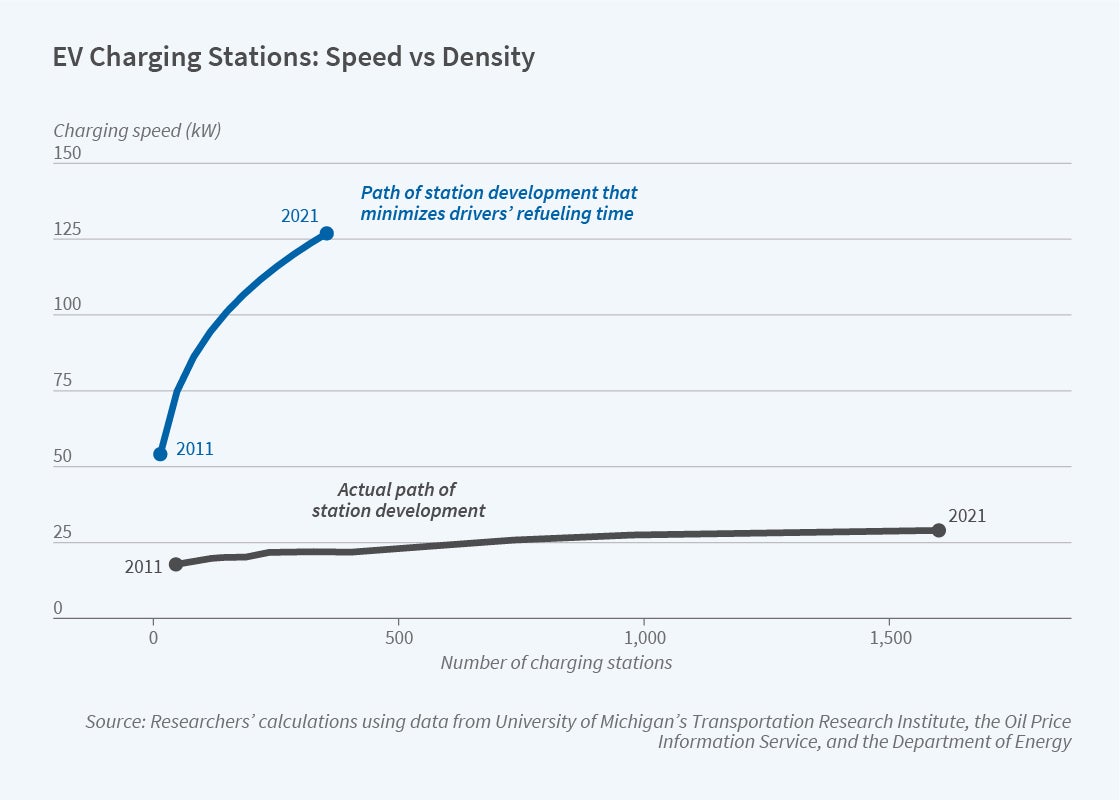Design Trade-Offs for Electric Vehicle Charging Networks

A range of public policies, including funding the construction of electric vehicle (EV) charging stations, are designed to promote a transition from gasoline-powered to electric cars. A study of driver behavior suggests that drivers’ willingness to embrace EVs will depend on the way funds for charging infrastructure are spent.
In Fueling Alternatives: Gas Station Choice and the Implications for Electric Charging (NBER Working Paper 29831), Jackson Dorsey, Ashley Langer, and Shaun McRae analyze driving data from a study of vehicle safety systems to inform the design of EV charging networks.
Public investments in faster electric vehicle charging stations, rather than more stations on the network, yield greater benefits per dollar spent.
The researchers use high-frequency GPS data on individuals’ driving patterns, refueling stops, and nearby gas station prices over the period April 2009 to May 2010 in southeastern Michigan to estimate the value that drivers place on their time. They observe that a typical driver chooses to refill at a gas station that is less than a minute off their planned route, despite the opportunity to save an average of 9 cents a gallon by traveling up to a minute longer to a less-expensive station. Based on these decisions, the researchers estimate that on average, drivers value their time at $27.54 an hour, or 89 percent of the local median wage. This value of time is substantially higher than the estimate used by the US Department of Transportation, which is 50 percent of wages. By using a lower value of time, policymakers are likely to understate the benefits of time-saving transportation investments such as EV charging infrastructure.
Charging infrastructure is uncommon in multifamily housing complexes: only a quarter of apartment residents have access to overnight charging. In part for this reason, homeowners are much more likely to purchase EVs than are apartment dwellers. Using their estimate of the value drivers place on their time, the researchers estimate that home charging and avoided trips to the gas station could save EV owners time worth $829 over the life of their car. For those without the option to charge at home, however, the long wait time for charging at public stations imposes a significant time penalty. The researchers estimate that recharging an EV at a public charging station would add 30.6 minutes to drivers’ travel times on average, through a combination of time spent waiting for vehicles to charge and time spent walking from a charging station to a final destination the while vehicle is left to charge. The average gas station visit, by comparison, increased travel time by only 2.5 minutes. This implies that the additional time cost of recharging an EV at a public station, over the life of a vehicle, would be $9,169.
This large cost difference is of particular relevance due to the recent passage of the 2021 Infrastructure Investment and Jobs Act, which provides funding for 500,000 vehicle charging stations. The researchers suggest that drivers would place greater value on policies that support investment in faster charging stations than on investment in additional stations with slower charging capability. In terms of time saved, a 1 percent increase in average charging speed would save 4.7 times more than a 1 percent increase in the number of charging stations. Fast charging is, however, expensive. Tesla DC Superchargers, which can charge more than 10 times faster than the average charger, also cost nearly 10 times as much. In 2021, less than 20 percent of US charging stations offered DC fast charging. Given the existing network, the researchers estimate that the return to additional investment in charging speed was nearly five times greater than the return to additional investment in the number of stations.
Given the high value that drivers place on their time, prioritizing faster charging stations could provide important support to the transition to electric vehicles.
— Steve Maas


